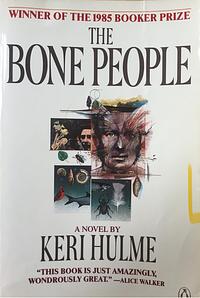Take a photo of a barcode or cover
I had to go get drunk after reading this. A long, poetic, slightly-heavy-but-not-quite read that broke my heart, one way or another
dark
emotional
reflective
slow-paced
Diverse cast of characters:
Yes
I picked this up in a second-hand book shop, intrigued by the title, then the cover, and then the blurb. This is a book to be read with attention, there always seems to be a bit more to understand than what’s written, and I constantly flipped to the back glossary to learn the meaning behind the Maori phrases. A beautiful story, with interesting deep flawed characters.
challenging
dark
emotional
mysterious
reflective
tense
medium-paced
Plot or Character Driven:
Character
Strong character development:
Yes
Loveable characters:
Yes
Diverse cast of characters:
Yes
Flaws of characters a main focus:
Yes
Graphic: Addiction, Alcoholism, Animal death, Child abuse, Child death, Cursing, Death, Domestic abuse, Emotional abuse, Gore, Physical abuse, Violence, Blood, Vomit, Medical content, Grief, Medical trauma, Alcohol, Colonisation
Moderate: Racism
I absolutely loved this book for the first 150 pages or so... then extremely graphic, violent chronic child abuse (to the point of long-term hospitalization of the six year old main character, to the point that the abuser is almost charged with murder) happened, with one main character (Joe) being the abuser and the other main character (Kerewin) being complicit in the abuse (she tells Joe to do his worst to the child at one point even though she knows Joe beats his child to the point of disfigurement). Hulme goes on a lot about how Joe loves his child despite the beatings and that the child is ultimately better off with him. The nurses/doctors/social workers/teachers are portrayed as well-meaning but wrong in wanting to remove the child from this environment. The only "good" doctor is the one that tells the child to misbehave and run away from his foster homes because he'll be better off with his abusers because they love him. We're supposed to sympathize with the two other main characters because they have dark pasts and trauma. Trauma is not an excuse for traumatizing others. confused why other reviewers say "this book is great because it shows the issue isn't black and white, I empathize with Joe" etc etc - I had no sympathy at all for these people and only read to the end because I wanted to know what would happen to the child -there's a "happy" ending and the child ends up with his abusers.
challenging
reflective
sad
slow-paced
Plot or Character Driven:
Character
Strong character development:
Yes
Loveable characters:
Complicated
Diverse cast of characters:
Yes
Flaws of characters a main focus:
Yes
The thing is, that the writing style, although confusing at times, is quite nice and gripping. I love the cultural aspects of the book, Kerewin resonates with me on some level, some episodes are so much fun really.
On the other hand, boy was it emotionally draining. I literally had to read this over the course of one and a half months just because every time I read it I felt afterwards like I needed a break.
I strongly advise against reading it if you are triggered by child and substance abuse. And the issue is not in the fact that it is there. The issue is in the attitudes of the characters towards it. The message is so messed up, the thing you learn from the story is that the opposite of what the characters are saying is true.
On the other hand, boy was it emotionally draining. I literally had to read this over the course of one and a half months just because every time I read it I felt afterwards like I needed a break.
I strongly advise against reading it if you are triggered by child and substance abuse. And the issue is not in the fact that it is there. The issue is in the attitudes of the characters towards it. The message is so messed up, the thing you learn from the story is that the opposite of what the characters are saying is true.
The Bone People is one of those rare books that is just utterly, seamlessly /alive/. I'm wary to say too much about it, because I don't want to spoil it, and because it's crucial that you find out what happens to the characters in the order that Keri Hulme intends. It's not a love story by any traditional standards, but it's probably the most honest and nuanced depiction of love I've ever read. Savor this book.
3.5/5 stars rounded up.
I had a hard time putting this book down! The novel follows three main characters: loner Kerewin Holmes (like the author, is of European and Māori descent), a young white mute boy named Simon, and Simon’s Māori foster father, Joe.
This novel is not for the faint of heart in both style and subject matter. While I think that some people may find it jarring and distracting, I loved the experimental writing style. Coupled with use of vivid descriptions and Māori language (glossary in the back) throughout, the magical realism and poetry infused in this book arguably add more depth to the story.
I was lost in the isolation and melancholy of Kerewin, a disillusioned artist, who, after a fallout with family lives alone in a large house by the coast. Her life takes a turn when she meets Simon and Joe. It’s a bit hard to talk about this novel without spoiling, but I will say that the developing relationships were fascinating to read. The entire book is a bit of a slow burn with certain sections that dragged and could have been shortened.
Through the main characters, Hulme discusses Māori culture and issues, including mental health, self-loathing, identity, alcohol & physical abuse, racism, the importance of heritage, and the effects of white colonization. While difficult and heartbreaking to read at times, I’m glad I read it.
If you’re into experimental writing and character-driven stories, don’t mind a slow-burn, and can stomach the subject matter… I’d give this a go.
Content Warnings: Alcohol abuse, child abuse, violence, self-harm, racism
I had a hard time putting this book down! The novel follows three main characters: loner Kerewin Holmes (like the author, is of European and Māori descent), a young white mute boy named Simon, and Simon’s Māori foster father, Joe.
This novel is not for the faint of heart in both style and subject matter. While I think that some people may find it jarring and distracting, I loved the experimental writing style. Coupled with use of vivid descriptions and Māori language (glossary in the back) throughout, the magical realism and poetry infused in this book arguably add more depth to the story.
I was lost in the isolation and melancholy of Kerewin, a disillusioned artist, who, after a fallout with family lives alone in a large house by the coast. Her life takes a turn when she meets Simon and Joe. It’s a bit hard to talk about this novel without spoiling, but I will say that the developing relationships were fascinating to read. The entire book is a bit of a slow burn with certain sections that dragged and could have been shortened.
Through the main characters, Hulme discusses Māori culture and issues, including mental health, self-loathing, identity, alcohol & physical abuse, racism, the importance of heritage, and the effects of white colonization. While difficult and heartbreaking to read at times, I’m glad I read it.
If you’re into experimental writing and character-driven stories, don’t mind a slow-burn, and can stomach the subject matter… I’d give this a go.
Content Warnings: Alcohol abuse, child abuse, violence, self-harm, racism
challenging
dark
emotional
hopeful
mysterious
sad
tense
slow-paced
Plot or Character Driven:
Character
Strong character development:
Complicated
Loveable characters:
Complicated
Diverse cast of characters:
Yes
Flaws of characters a main focus:
Yes
Graphic: Child abuse

